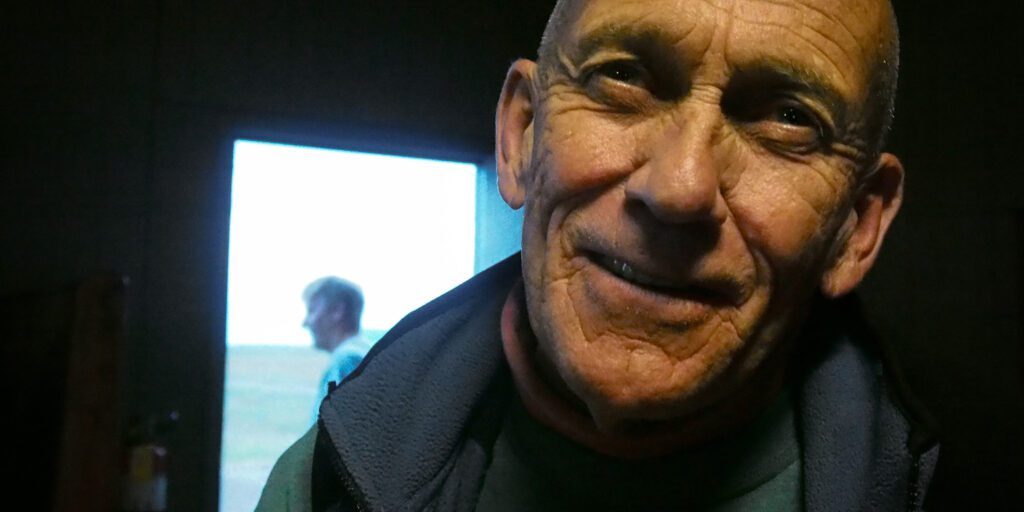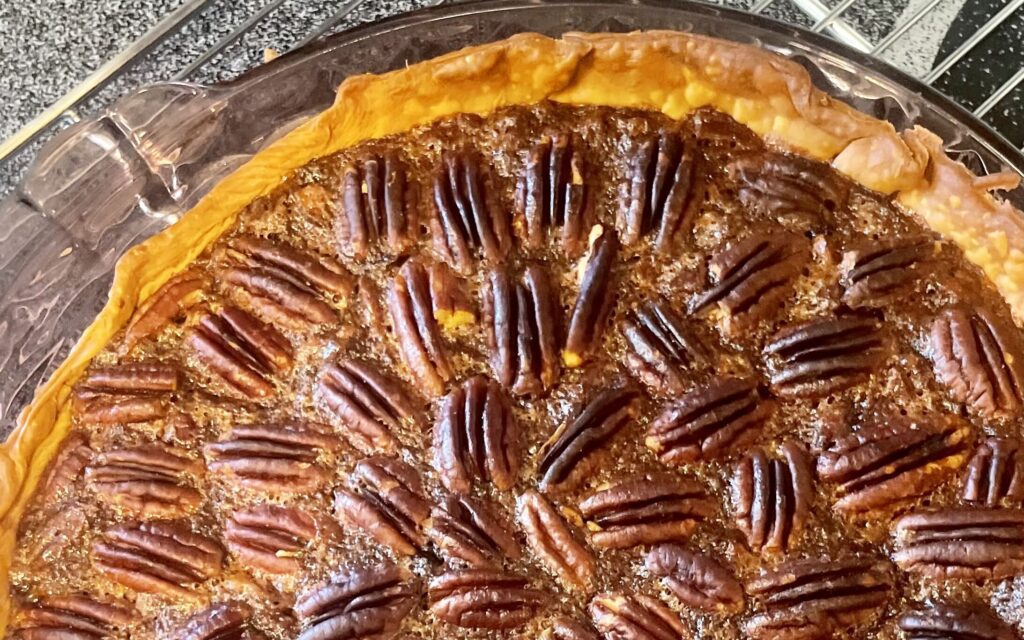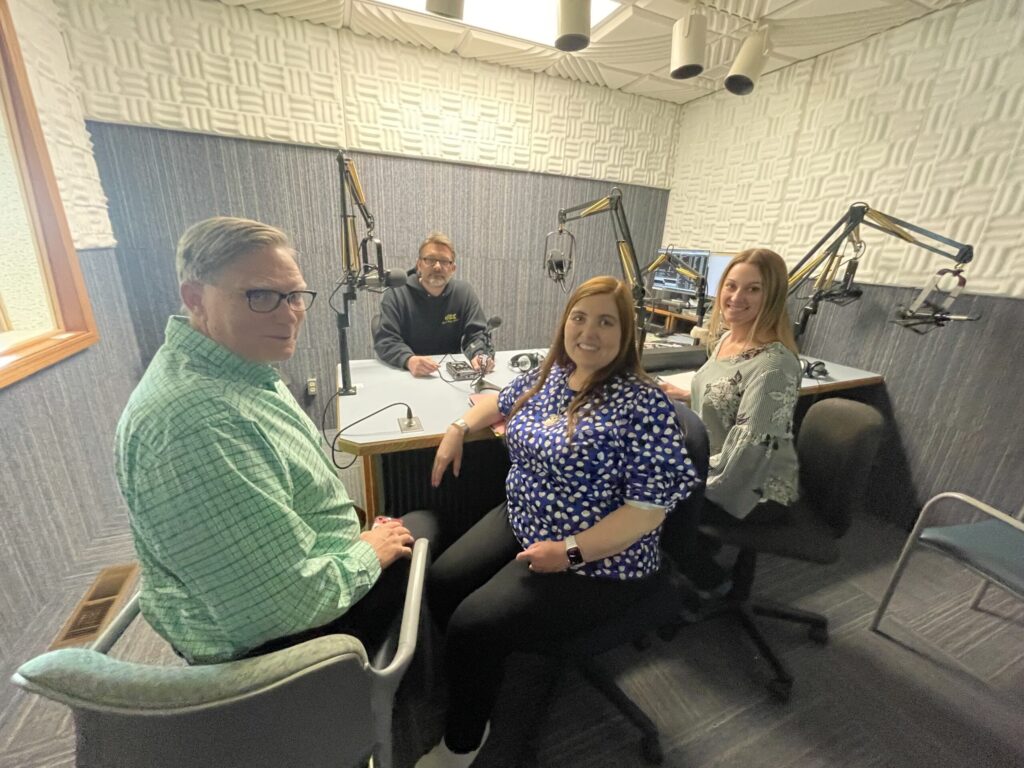In this KNOM Feature, Nome Mayor James “Richard” Beneville reflects on a life of service in Western Alaska. In the fall of 2019 Richard sat down with KNOM to share his wisdom in this final interview. Click below to hear Richard tell the story of his life, in his own words. The mayor passed away on May 11th, 2020.
Beneville: It’s a very interesting place to start because we just had something happen, and I’m looking at the future too, and that is the amount of cruise ships and speaking of tourism…Two things about the Maasdam, Holland America ship. Our tourism, as far as cruise ships are concerned, has grown greatly. New ships, ships that have been here before and some that haven’t, so it’s really really exciting. I remember at an ATIA travel convention meeting years ago, one of the guys who is very big in tourism and a highly placed Holland America official said to me while I was standing up and doing my thing about the north, this was like in the late 1990s… and he looked at me and said ‘you know Richard, you’ll never see a Holland America ship off Nome,’…ba dum bum, look what just happened! Sadly, they couldn’t get off the ship because of other reasons, but the fact that the Maasdam was here [in Nome] indicates to me that we are exactly on the right track.
But, climate change…there’s good and bad with everything that happens. A volcano is destructive, but it creates fertile land. So there’s always a good side and I’m a Pollyanna, I tend to look on the bright side, and I see great opportunity for our people, the people in Nome, the people in the region, the people of Alaska, and the people of the United States. I see a wonderful bright way to do an awful lot of things.
KNOM: Well that’s a great start, so this is going to be just a general sharing of your wisdom and input. How long have you been in Nome Richard?
Beneville: I moved down from Utqiagvik, Barrow, in 1988.
KNOM: What was your first memory of being in Nome?
Beneville: Easy, easy. I had wanted to move, not because I didn’t like Barrow, I loved it; had a great time there and made good friends who are still my friends today. But I wanted to see the rest of Alaska and I was trying to sober up and all of that sort of thing…notice how I just skipped right over that, it was my life for God’s sake. In any case, Alaska Commercial (AC) said you can go to any big store, don’t go to a small store, but we’ll send you anywhere you want to go within our chain, and they must’ve had 40 stores in the state or something. So I looked at Dutch Harbor, down in the Aleutians, and I looked at Nome; and I chose Nome. So here’s the answer to your question, I came to Nome and there’s a group with signs at the airport saying ‘Move to Nome, Richard!’ And it was because of the arts and it was members of the Arts Council then. They had gotten word that I was an old gypsy, so they wanted me to move here because there was a lot of theater then and we have a lot of theater today. Nome also has Air Force history, I grew up in the Air Force! That I know about. We grew up during the Cold War and we have the White Alice towers right outside the door [in Nome], Hello Central!
And I’ve always been fascinated by gold rush towns, I’ve worked a lot in theaters, renovated opera houses in Central City, Alma, neat neat places so there you go.
KNOM: So from the beginning, your theater background was calling you. What was your first play?
Beneville: It was Peter Rabbit! And I had what we called Doctor Dentons, those pajamas with the little feet in them. I was a little boy, maybe in first or second grade, and I had little pink ears. The curtain opened and I wet my pants. That was my first appearance so I figured I could only go up from there.
Theater has been in my life ever since I can remember. It was my ambition, it was my, I guess you could say, a calling I knew about. But calling… That sounds like you’re speaking for God, and I don’t pretend to.
KNOM: Was there any theater background in your family?
Beneville: My grandmother, who I quote all the time, Flo was married to a guy named Vinny Morris. They were a close family with a lot of brothers, and they formed their little group on Thanksgiving and Christmas [annually], they called it the Morris Merry Minstrels. They sang Irish songs with dirty lyrics, which I wish I could remember. I never wrote that down and I should’ve, there’s another lesson in life. But professional theater? No. But that’s what I wanted, and I knew that.
KNOM: And so you started to pursue that [theater] in the most iconic of cities, in New York City on Broadway…
Beneville: After I grew up in the Air Force, so I lived around the world. Wow was that great. Graduated from high school in England, still with this burning [for theater]. I had started tap dancing when I was six. I did USO shows in military hospitals and that sort of thing when I was 12 and 13. So I was on the way. And then after a couple of years of not succeeding at college (what is this study stuff?), I was in rehearsal all the time or doing something. So, then I went to New York and like I said the good Lord had blessed me with some talent. And I knew what I wanted, I was motivated, I was directed, and I was very lucky in that. A lot of people don’t have that epiphany until they’re my age now, 74. See how I snuck that in my hero?
KNOM: So now you’re in New York City, you knew what you wanted, and then what would you say happened next?
Beneville: I love New York! (*sings New York, New York by Frank Sinatra) To this day it’s a mystical place in my mind and in my heart.
Well what happened then? Well the worst thing was that my drinking got worse and that was what ended my almost 20 years in New York. I did okay, God gave me talent, I was there, knew how to tap dance, and my Mother said I was cute.
I’ll never forget: this was my awakening. I was in New York for a couple weeks and the trade paper, Backstage and Showbiz, I used to get them both. I was looking at the auditions in the back and I read ‘Looking for replacements in You’re a Good Man Charlie Brown. Short, tenors, with big voices, blue eyes and good form, good background in tap.’
And I said that’s me! Hello! This wasn’t hard at all. So with my little portfolio and my new 8x10s I went down to the theater in the village to go to this audition. I open the door to the theater and there were 300 me’s, 300 short little, cute little, big voice, tap dancing fools (for the most part); and that was my awakening. I had heard about the competition, I knew it was tough, but I just got it right in the face and that was daunting. I almost became a ditch digger, [I] probably would have been built better.
So I didn’t get the job, I don’t even think I got called back, but it was my bing (*light bulb turning on sound)
Beneville: I had worked all the time, I worked the phone, and I described it as the phone never stopped ringing. I didn’t usually audition because over the years I was reliable, I was good, but the drinking eclipsed that and eventually the phone stopped ringing. Then I couldn’t do anything and boy was I feeling sorry for myself. I had a relationship that ended which I didn’t want to end, but it did. And the spiral, that’s how they describe it, I was on a downward spiral.
So my family and friends decided we’ve got to do something, an intervention, or he’ll be dead…and next thing I know I was on an airplane with a one-way ticket to Anchorage, Alaska to visit my brother Burt who at the time ran Merrill Lynch’s office in the state. So that’s about a sentence on something that was incredibly painful at the time. I didn’t see it so much as painful, I knew it was because it hurt, and I was drunk all the time.
I remember once I lived in a nice apartment in the Upper West side, I had a rent controlled [one] and I couldn’t pay the rent which meant I couldn’t pay the utility bill, so they turned off the lights. I didn’t know you could turn off the lights in one apartment, Hello Central, they could. And I remember using an extension cord to my friend across the airway, who played in the New York Philharmonic. So, I had power for the television and to keep my beer cold and ice for my scotch. So, it just went from there. [My family] they did that intervention and my good friends packed me up, and I was a mess.
I was excited about Alaska. Alaska to millions and millions of people, even today, is a gleaming in their hearts. It’s the Last Frontier. I didn’t see it as banishment, which it wasn’t exactly. I had either the Marines, which I was too old for and they wouldn’t want me anyway, or go to Alaska to visit my brother. Two people saved my life, my brother and collectively the people of Utqiagvik (Barrow, Alaska). That over a period of time began a process of self-knowledge. I guess I was smart, I listened to that inner voice. I knew I had to do something, I knew it. But I couldn’t, I was powerless, helpless, but I had to do something. And I didn’t realize it until I just said it that I was a prime example for Alcoholics Anonymous. That was what I ended sobering up with (AA), well knock on wood, until I have a drink, which I hope I don’t…
KNOM: So you’re with your brother Burt in Anchorage, and then….
Beneville: Burt was so cool! He was at Merrill Lynch, but my brother Burt was the adventurer of the family. My brother Peter was a diplomat. My brother Jack, who knows about brother Jack, it took him 8 years to get out of the University of Miami-Florida, and he’s a great guy that went into the Air Force. But Burt was this sail the seven seas and see the world type. And so he ended up with Merrill Lynch and he was very good…When he first moved to Alaska with ML and it was the end of the Trans-Alaska-Pipeline, he was able to get some of these guys started with annuity programs. So, they were making good money and he would fly up to the North Slope and talk with them. He’d say, ‘now look, you’re going to go into Anchorage in a couple weeks and blow all your money. Listen to me…’ A lot of them did listen, and I didn’t. I remember when I went up to work at AC in Barrow and he said, ‘send me a third of each paycheck,’ and I didn’t.
KNOM: So you went to see him in Anchorage but how did you end up, as you like to say, “selling ice boxes to the Eskimos?”
Beneville: And by the way, that’s an expression I use ever so carefully, ever so carefully. Because it could be a story of Dickie making fun of a situation, but it’s an irony. My grandmother once told me, ‘One of these days, Dick, with your mouth…(you’ll be selling ice boxes to the Eskimos.)”
I was about ten years old, if that. And all of sudden one day I’m selling a freezer to Thomas and Myrtle Aguchuk up in Barrow, Alaska. It hit me, like a ton of bricks, and I started laughing and crying because it had come true. Grandma Flo was right on the money.
So Burt had introduced me to Allan Galant, and he was then the president of Alaska Commercial Company which was then owned by a Native organization, and I thought the idea was that it was an altruistic thing. I was going to do as much as I could to help. Little did I realize that I was going to one of the wealthiest communities on the planet. I didn’t need to help them, they in turn helped me.
KNOM: Tell me about Barrow, what was your impression of the area when you got there?
Beneville: I got there February 1st, 1982. It was 11 o’clock in the morning, the middle of the night, 40 degrees below zero and the snow was blowing up. The darkness helped me. The darkness was insular. The darkness helped me to… I mean I couldn’t have gone anywhere more opposite of what I knew, in every respect. And I loved it immediately….
You wanted me to finish my thought? I never finish thoughts because often I forget what I’m saying.
KNOM: That’s okay. What else was included in your experience with the culture, the people, like you said it was the polar opposite of where you came from?
Beneville: Well I’m a dancer. I taught tap to some of the guys in one of the dance groups up there [in Barrow]. And I have been dancing since I was a little boy, I know dance, and I love dance. But I looked at Native dancing and I could not get it. I didn’t understand, until I noticed something.
In the West, dance is, more often than not, the illusion of flight. Women are on point, the weight is forward, tap dancing…but the weight is forward it’s on the ball of your foot. And I was looking at Native dancing and it’s the opposite. The weight is back, the weight is on the heel, in fact your knees are bent, and your weight is on your heels, and there is a reason for that. I haven’t heard anyone other than myself say this, but it’s about power. The power of the energy and the power of those things that we can’t even understand, that comes up from the Earth, from Mother Earth, up through the body and out through the hands. And you look at American Native dances, you look at the Maori that were here (in Nome) when we did that big thing with the Arts Council years ago… So yes, it’s this power going this way, but in the West it’s very different, philosophically it’s just different. That was huge and it took me a very long time [to understand]… It took me until I started giving tours and talking about the cultures. Here I am talking about culture of which I am not, and that’s when the listening came in. Anyways…
I feel very much at home, but in certain areas and certain venues I am an outsider. That is the truth, I am an outsider. But I am one who has listened, one who feels how important it is, all of these things, so….
Sometimes if you’re lucky, something happens in your life, and I was fortunate that the good Lord let me see what was going on. Well actually no, it was the Inupiaq people of Barrow that gave me the eyes to see what was going on. So whenever I think about it, whenever I make my speech, whenever I talk about my story, I preface it… But I owe them everything, the fact that I’m sitting here talking to you.
Beneville: What made up my mind about coming to Nome, the Air Force history, 350 miles of roads, ohhhh very nice! I am not Mr. Snowmachine, I am not Mr. Four-wheeler, I am… Hello Central. But here you’ve got the roads and I can get out and see the beauty.
Now in the old visitor center, was a picture of a cast picture taken at the Eagle Hall on Front Street in 1907. The cast picture was of a play, I don’t know if it was a company that was hired to come up here and entertain or if it was a local thing, but it was called ‘The Man from Mexico’. And I looked at that photograph, and I said ‘Gee, theater? Hello Central! I could do worse.’
They [Nome] liked theater in 1907 and they might still like theater today. Sitnasuak Native Corporation approached me at the time, they said ‘Richard, we would like to start a tour of Nome. We think there is a market for it.’
I never thought about it, but actors should make a good tour guide. You’re telling a story and that’s what we do, that’s what actors do, they tell stories. So I started Nome Discovery Tours, and then for reasons that are many, and confusing, and business related… I changed that from having one partner to not having them as a partner and then Mary Knodel and Matt DeSelarnos and I went looking for partners. We formed a company called Nome Custom Adventures and off we went. At the time, MarkAir was just beginning to fly into Nome, and they were looking for a ground tour person.
The theater, I did The Fantasticks here just because I wanted to do it and I love it, it’s a great musical. Then I wanted to go for the gusto, and I chose to do Music Man. But then a couple years later I was doing Fiddler on the Roof and MarkAir was coming to take my tour, which I couldn’t give them because I was busy with the play. God forbid you interrupt my rehearsals. So, I said ‘Look, you come see a dress rehearsal for Fiddler on the Roof, and then if by the end of it you should see that I am able to give a tour. Hello Central.’
So they went to the dress rehearsal and it was very successful. Neil Burke came up to me and said ‘Yeah, you can do what we want you to do, there is no doubt in our mind.’
And so it became a really unique avenue of performance for me. I do two things on every tour that people don’t really know about: I reinforce my sobriety because I talk about alcohol and I talk about my experience with it, and the gift of sobriety. And then I talk about performance, sometimes on tours I sing, and sometimes I dance. I get the story out, I get the history out because I am quite knowledgeable and I’ve listened, I feel confident. And I paint pictures and that allows people to see, and it’s a lot of fun for them, entertaining for them as well as for me.
KNOM: I have to ask you to share the story about Nome River Sally.
Beneville: (*Sings Nome River Sally, Lives in an Alley…) How did she come about? We were doing the Miners and Mushers Ball, and pretty much every year we were doing a Can-Can line for it… In that spirit of the dame, it’s not transsexual, it’s not cross-dressing, but it is because it’s entertainment. So Nome River Sally was honest, she had a lot of hair, she had big bosoms and a tight, tight dress. The last time I had that dress on, it took about 20 ‘I Love Nome’ pins to [hold it up] because the zipper had died and my body had settled. It took all of these things and a lot of makeup, I mean I didn’t put it on with a brush, I put it on with a trowel, just lots and lots of makeup. And she was broader than life. She was very honest and quite abrupt; did I say honest? She called it like it was, and she sang, she danced. It was the perfect character for me. And she was theater, it was theater…it’s always there, nothing I can do about it, performance. It’s in my life.
KNOM: And now it’s iconic for most Nomeites, John Handeland and Joy Baker have spoken about it, people who have known you for decades. Is there anything similar to that you can share?
Beneville: That morphs into an ability, and I say this in all modesty, because what I learned from the Air Force is that I am good at diplomacy, I think. Or at least I’m told I am. And that makes it good for me to go to Iceland, Greenland, and these different places to speak honestly, but compassionately about what’s happening around me and to whom it is happening. Not everybody is onboard with stuff. But there are opportunities here that will help and benefit us all.
Beneville: They (Nome) let me stay, they let me stay and I was myself. I’ve never apologized for that, never. I am what I am and everyone knows it. I don’t have to say it, people know what I am. And that’s okay, I don’t have a problem with that, because I’ve been that all my life.
I think one of the great things that happened to me in Nome was working in education. Being the After School and Activities Director… If you had said to me fifty years ago ‘Richard, you’re going to live in rural Alaska and work with children.’ I would’ve said I don’t think so. You’ve got the wrong dude, dude.
But I did and I loved every minute of it. It drives them crazy, but I call them all my kids and some of those kids have kids of their own now. It’s like my family, it really is. I tried my very hardest to give back to the community. I am a big doer of that sort of thing, I think we all are to a degree, but I know I am. It’s a motivator for me. Not because I feel like a knight on a…wouldn’t I look great on a white horse, with the shining armor? Not at all.
But if we had a world full of people…No that’s not it to have a world full of people like me, God forbid. But that attitude [of giving back] is so important.”
To hear KNOM’s live coverage of the local memorial service and parade for Richard Beneville in Nome, click here. Please note that our coverage ended one-hour into the program, and the memorial service continued beyond that.
KNOM’s Karen Trop also contributed to this report and its production.
Image at top: Photo of former Nome Mayor Richard Beneville. KNOM file, 2014.







